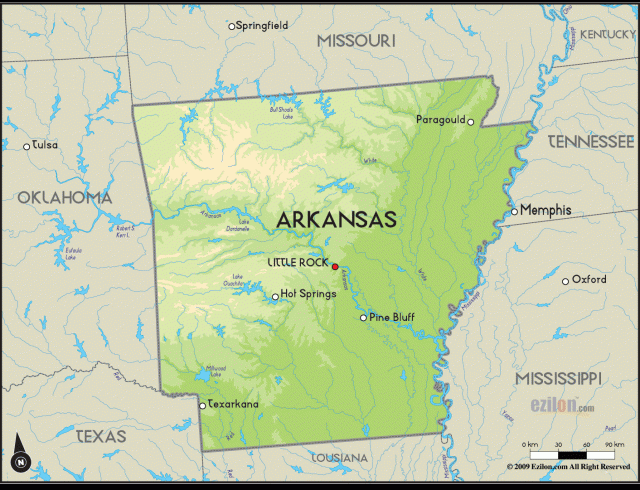The State of Arkansas
AT A GLANCE
Name: The word Arkansas is from the French name for the Quapaw tribe, the Arkansa, and the region the tribe inhabited.
Nicknames: Natural State, Razorback State, Land of Opportunity
Capital: Little Rock
Size: 53,182 sq. mi.
Population: 2,966,000 (2014)
Statehood: Arkansas became the 25th state on June 15, 1836.
Electoral votes: 6 (2016)
U.S. Representatives: 4 (until 2016)
State tree: pine
State flower: apple blossom
State bird: mockingbird
Highest point: Magazine Mountain, 2,753 ft.

THE PLACE
Arkansas is located on the borders of the southern and central parts of the United States. The Ozark Plateau and Ouachita Mountains in the northern and western parts of the state are mountainous and densely forested. The southern and eastern parts of the state are lower in elevation.
The Mississippi River forms the eastern border of the state and makes this region suitable for agricultural use. The West Gulf Coastal Plain, in the south and southwestern portion of the state, is low in elevation and has pine forests, natural gas and petroleum deposits, and beds of bromine salts.
Arkansas has many lakes and rivers. The largest is the Arkansas River, which flows southeast across the state. Natural springs are also common around the Ozark Plateau and Ouachita Mountains. Summers in Arkansas are hot and humid while winters are cool, especially in the mountains.
Facts and Firsts
- Arkansas is home to 50 state parks, 6 national parks, 2.5 million acres of national forests, seven national scenic byways, and three state scenic byways.
- Arkansas's hot springs are nationally known. Some famous Americans, including President Franklin D. Roosevelt, baseball player Babe Ruth, and gangster Al Capone, visited Hot Springs National Park.
- Buffalo National River is one of the few free-flowing rivers in the continental United States.
- Arkansas has the country's only active diamond mine, Crater of Diamonds State Park, which is located near Murfreesboro. There, tourists and prospectors alike can mine for diamonds and other precious gems, including amethysts, garnets, jaspers, agates, and quartz crystals.
- Texarkana is divided by the Arkansas-Texas state line. The city has two governments—one for the Arkansas side and one for the Texas side. The Texarkana post office building straddles the state line, standing in both states.
THE PAST
Native Americans have been living in Arkansas for approximately 12,000 years. The first Europeans to explore the state were Spaniards. In 1541, Hernando de Soto searched for gold and silver deposits in Arkansas. In 1682, French explorers claimed the Louisiana Territory, which included Arkansas. French colonists settled the region and began to exploit its natural resources, including trees and animal furs.
Spain gained control of the Louisiana Territory in 1762 through a series of wars. In 1800, the region returned to French rule, until the United States bought the territory through the Louisiana Purchase of 1803.
In 1836, Arkansas was admitted to the Union as a slave state. When the Civil War broke out, Arkansas eventually seceded (withdrew) from the Union and joined the Confederate States of America.
Toward the end of the 1800s, Arkansas began to expand rapidly. Railroads were built, and timber became a leading industry. The state remained mostly agricultural, however, until the 1950s, when manufacturing became more important and Arkansas quickly became industrialized.
THE PRESENT
Arkansas is a popular vacation spot. The state's lakes, rivers, and rugged Ozark Mountains make it an ideal location for boating, fishing, water sports, and hiking. Arkansas's many hot springs are also wellknown attractions.
Despite its tourist attractions, Arkansas is primarily an industrial state. Food processing is the state's most important industry, but electrical manufacturing is also notable. Agriculture is still significant, and Arkansas leads the country in rice production and the raising of chickens. Cotton and soybeans are also common crops, and lumber and wood product industries flourish.
Arkansas's large deposits of bauxite, an ore used to make aluminum, make mining another key industry. The state also has deposits of natural gas and petroleum. Despite Arkansas's rapid industrialization, the state's citizens have not forgotten their early folk customs.
Folk festivals and county fairs, including the Arkansas State Fair and Livestock Show, bring Arkansans together. The town of Mountain View, the Folk Capital of America, preserves the original pioneer lifestyle, and attracts many visitors to the Ozark Folk Center State Park.
Born in Arkansas
- Helen Gurley Brown, editor
- Glen Campbell, singer
- Johnny Cash, singer
- Eldridge Cleaver, black activist
- William Jefferson Clinton, U.S. president
- Jay Hanna “Dizzy” Dean, baseball player
- James W. Fulbright, U.S. senator
- John Grisham, author
- Douglas MacArthur, general
- Mary Steenburgen, actress